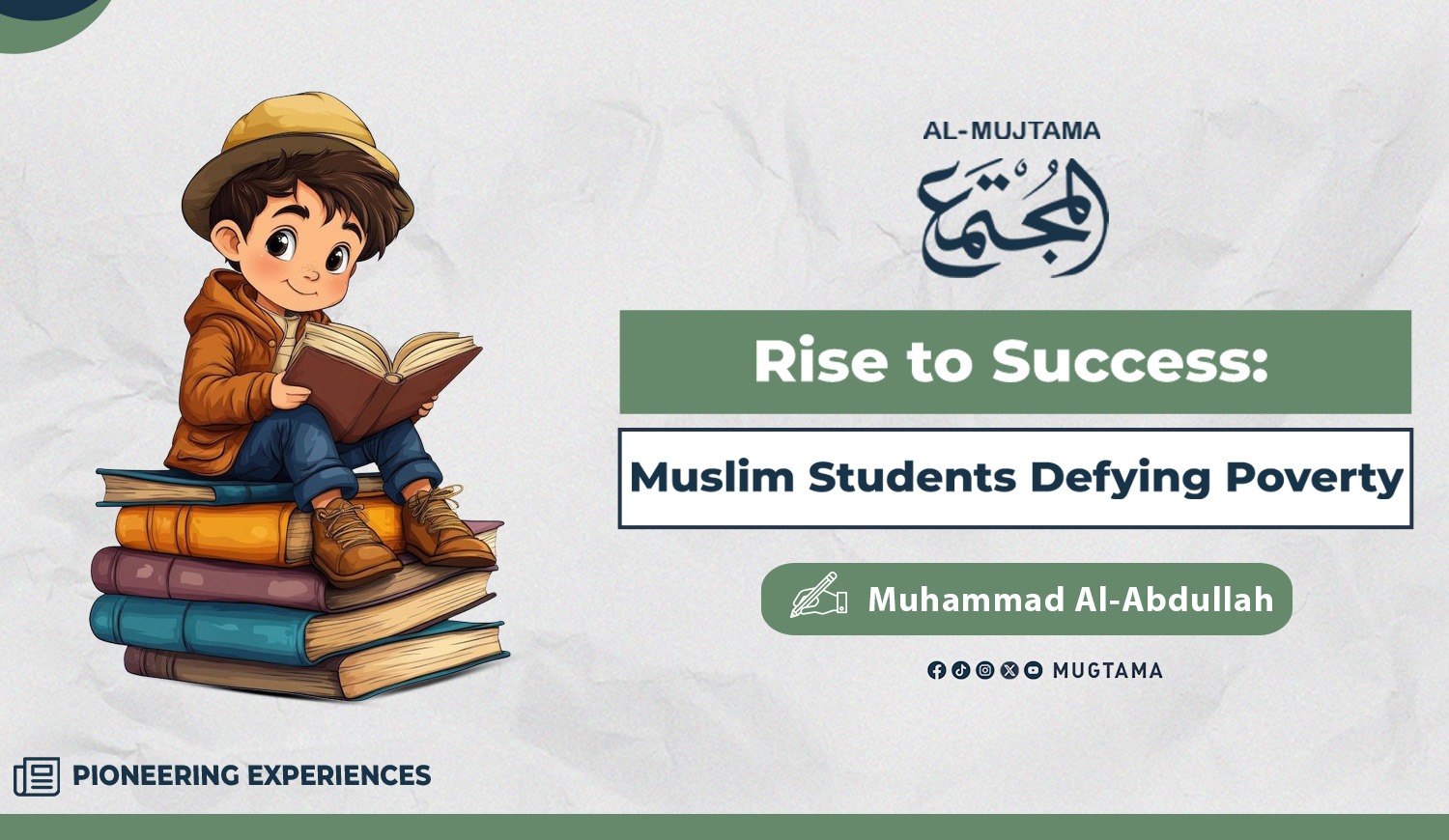Rise to Success: Muslim Students Defying Poverty

We may inherit money and become wealthy,
but we cannot inherit talent—for it is not passed down, rather it is a divine
gift that increases or decreases according to personal abilities and the effort
invested in nurturing them.
You may be poor, and that does not disgrace
you. But poverty is neither a virtue nor a surrender to the harshness of
reality. You are religiously required to earn money through lawful means and
improve your living conditions.
You are not required to be talented, but
you must be serious and successful. Many people mistakenly believe that success
depends on having money, in order to overcome the severe hardships of life.
In our fast-paced, technology-driven age, imagine someone without a mobile phone—you would
think he belonged to prehistoric times. But what if such a person were a
distinguished student who achieved remarkable academic success without owning a
phone?
A few days ago, activists praised a video
that circulated on social media, recorded by a surveillance camera, showing a
young man standing in front of a shop, inquiring about his high school
results—because he did not own a phone.
His inquiry was crowned with success and he
excelled. He appeared joyful and happy, and his very first reaction was to
prostrate in gratitude to Allah.
A smile lit up his face, and satisfaction
was evident in his expression and demeanor. He shook hands with the shop owner
after receiving the news. His attitude showed no resentment or frustration at
not owning a phone; instead, he gave a lesson that hope, determination, and
willpower can achieve great things without the tools that have dominated our
lives and that we fear losing.
It was later revealed that the video was of
a student from Algeria. His story opened the door to other examples of simple
people who possessed nothing beyond their daily bread, yet they did not
surrender to poverty—they achieved outstanding success and entered prestigious
universities. Among them was another Algerian youth, whose story of struggle
was even harsher than that of his compatriot.
Excelling Without a Smartphone
Despite poverty, deprivation, and dire
hardship, the outstanding student Nasser Nasri, from El Bayadh Province
in Algeria, proved his determination and diligence. He spoke through his
actions after a journey of patience and struggle.
He achieved excellence while studying
outdoors, sitting on bare ground, possessing only his daily food. He revised
under daylight, living in a shack-like home vulnerable to rain in winter and
burning heat in summer.
Nasri and his family live in a tin house
devoid of the basic conditions of life. What drew attention most was that this
brilliant student never attended private tutoring sessions, owned no
smartphone, nor even had a room for study—yet he ranked among the top
achievers.
This year, 2025, he scored 18 out of 20
in the Middle School Certificate despite the crushing poverty he and his family
endure, under circumstances almost unbearable for anyone.
A Proud Yemeni Example
Nasri was not alone among the heroes of
perseverance against poverty and hardship. Another student shared the same
struggle—this time from Yemen. Though worlds apart geographically, the
willpower of Sami Abdullah brought him success, and his determination
fulfilled his aspirations.
This Yemeni student scored 97.13% in
this year’s high school exams, despite not having enough time to dedicate to
study, as he worked in a restaurant in Sana’a to support his family.
He left his hometown Al-Hodeidah six years
ago with his family to settle in Sana’a. Poverty did not defeat him; he
continued his studies and earned a distinguished place.
Living with six family members, he worked
hard to provide for them. At only seventeen, he achieved an exceptional feat in
the scientific stream of high school. Despite poverty and hardship, he still
clings to his dream of studying nuclear physics.
From Selling Freska to a Scholarship
in Medicine
A few years ago, Egyptian student Ibrahim
Abdelnasser became a sensation on social media. His story turned platforms
into arenas celebrating his grit and discipline. Refusing to yield to poverty,
he transformed from a boy selling sweets on the beach to a medical student.
The “freska seller” shocked everyone when
he scored 99.6% in high school, earning admission to medical school—a
privilege usually reserved for well-off families who provide every means of
success for their children. His story was a rare lesson in perseverance.
After his success, his first words were
that he was the happiest person alive, because he had brought joy to his
hardworking father. His achievement brought him calls from many, including the
Minister of Education at the time, who assured him that the doors of medical
school were open for him if he continued with patience and determination.
The unexpected ministerial decision filled
him with immense joy. But he did not escape his reality or disown his humble
work. Instead, he proudly declared that his labor was the path to his
achievement. He did not surrender to harsh circumstances or rebel against his
family; he remained steadfast, dignified, and resilient.
As-Sumait: A Kuwaiti Model of
Supporting the Poor
These stories of simple people and their
struggles are moving, yet they are quickly forgotten as another more striking
tale takes their place. But instead of merely weeping over the poor or
indulging in sentimental pity, there are practical solutions beyond
storytelling and self-soothing compassion. This is exactly what Kuwaiti doctor Abdulrahman
As-Sumait embodied—transforming emotion into reason, entertainment into
action, and narrow sympathy into a global mission to enrich the poor and save
them from missionary exploitation.
As-Sumait was a pioneer whose project
became an inspiring model to rescue the poor—achieved through sincerity and
steadfast will.
Africa became the fertile land for his
project, where he faced fierce missionary campaigns exploiting poverty to force
people into conversion. He rejected this approach, instead helping both Muslims
and non-Muslims alike, for all are human beings in need.
His three-decade journey to fight poverty
led to more than 10 million people entering Islam.
As-Sumait dedicated himself to humanitarian
work early in life, directing his efforts toward the poorest parts of the
world, making his life journey more beneficial and impactful for anyone wishing
to do good and support the poor.
His charitable spirit was evident even in
his youth—during high school, he and his friends pooled their daily allowances
to buy a car, which they used to transport poor laborers to and from their
workplaces free of charge.
After a long and exhausting journey, As-Sumait
crowned his mission with the establishment of an educational organization
serving over half a million students, owning more than four
universities, digging and equipping over 8,600 wells, and preparing
and training more than 4,000 preachers and teachers to save people from
ignorance.
-------------------------------------------------------------
Read Also:
-
Artificial Intelligence and Education: Risks and Opportunities
-
“Doom Scrolling” … Why Can’t We Stop Looking at Our Phones?!











